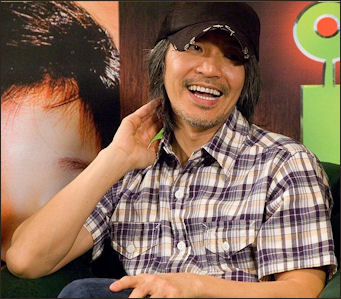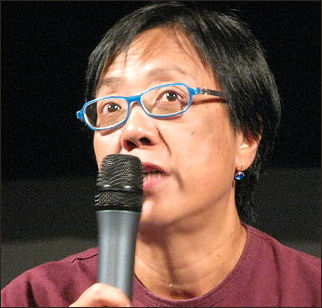HONG KONG DIRECTORS
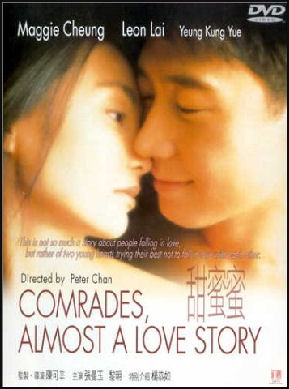
Johnnie To is known for his Hong Kong gangster films. “Election” and “Election 2" were featured at the Rotterdam Film Festival. They are about feuding triad members. Ringo Lam, directed “City of Fire”, which was virtually copied in Taratino's “Reservoir Dogs”, and made “Maximum Risk, Prison on Fire”, and “Bloodstone” with Claude van Damme; Mabel Cheung, director of the epic film “The Soong Sisters” and “Beijing Rocks”.
Peter Ho-Sun Chan's “Comrades, Almost a Love Story” (1997) cleaned up at the Hong Kong Film Awards with nine wins. Chan based the story in part on “Casablanca”. He also directed the acclaimed “He's a Woman, She's a Man” and “Perhaps Love” (2006), a musical about an affair between a trapeze artist and a circus manager also inspired by “Casablanca”. The son of a film directors, Chan was born in 1962, spent his teens in Bangkok and studied film in Los Angeles. He began working on films in the early 1980s as an assistant to John Woo and worked on several Jackie Chan productions. His directional debut “Alan and Eric: Between Hello and Goodbye” was voted best film at the Hong Kong Film Festival in 1991. “The Warlords”, directed by Peter Chan and staring Jet Li, Andy Lau and Taiwanese-Japanese actor Takeshi Kaneshiro, is a $40 million remake of the martial arts classic The Blood Brothers made in 1973 by Chang Cheh. “Bodyguards and Assassins”, a mainland Chinese-Hong Kong co-production directed by Peter Chan was up for 18 prizes at the Hong Kong Film Award in 2009.
Wayne Wang was born in Hong Kong, attended a British private school and then moved to the United States when he was 18. His films include “Life is Cheap, but Toilet Paper is Expensive, Smoke, Blue in the Face” and “The Joy Luck Club”. “The Chinese Box” was panned at the Venice Film Festival. Starring Jeremy Irons, Gong Li and Maggie Cheung, it is set in the middle of downtown Hong Kong during the middle of the hoopla surrounding the 1997 Hong Kong handover and is about the relationship between a dying British journalist and two Chinese women. “The Center of the World” is about a torrid relationship between a stripper and a dot.com millionaire and features lots of sex scenes.
See Separate Articles: MARTIAL ARTS FILMS: WUXIA, RUN RUN SHAW AND KUNG FU MOVIES factsanddetails.com ; BRUCE LEE: HIS LIFE, LEGACY, KUNG FU STYLE AND FILMS factsanddetails.com ; JACKIE CHAN: HIS LIFE, FILMS, STUNTS, INJURIES, ENDORSEMENTS AND TROUBLES factsanddetails.com ; JET LI factsanddetails.com ; HONG KONG MOVIE INDUSTRY: ACTION, TRIADS AND GHOSTS factsanddetails.com ;
Websites: Love Hong Kong Film lovehkfilm ; Hong Kong Cinemagic hkcinemagic.com ; Hong Kong Movie Database hkmdb.com; Martial Artist’s Guide to Hong Kong Films magthkf.ronlim.com </a; Chinese Film Classics chinesefilmclassics.org ; Senses of Cinema sensesofcinema.com; 100 Films to Understand China radiichina.com. dGenerate Films is a New York-based distribution company that collects post-Sixth Generation independent Chinese cinema dgeneratefilms.com; Internet Movie Database (IMDb) on Chinese Film imdb.com ; Wikipedia List of Chinese Filmmakers Wikipedia ; Shelly Kraicer’s Chinese Cinema site chinesecinemas.org ; Modern Chinese Literature and Culture (MCLC) Resource List mclc.osu.edu ; Love Asia Film loveasianfilm.com; Wikipedia article on Chinese Cinema Wikipedia ; Film in China (Chinese Government site) china.org.cn ; Directory of Interent Sources newton.uor.edu ; Chinese, Japanese, and Korean CDs and DVDs at Yes Asia yesasia.com and Zoom Movie zoommovie.com ; Bruce Lee, the Divine Wind bruceleedivinewind.com ; Jackie Chan Official Site jackiechan.com ; ; Wikipedia article on Jackie Chan Wikipedia
RECOMMENDED BOOKS: “New Essential Guide to Hong Kong Movies” by Rick Baker , Kenneth Miller, et al. Amazon.com; “Hong Kong Babylon, Guide to the Hollywood of the East”, a well researched book by New Yorker staff writer Frederic Dannen Amazon.com; “The Hong Kong Filmography 1977-1997" by John Charles (McFarland). Amazon.com; “More Sex, Better Zen, Faster Bullets: The Encyclopedia of Hong Kong Film” by Stefan Hammond , Mike Wilkins, et al. Amazon.com; “Hong Kong Action Cinema” by Bey Logan “The Cinema of Hong Kong: History, Arts, Identity” by Poshek Fu and David Desser Amazon.com; “Hollywood East: Hong Kong Movies and the People Who Make Them” by an enthusiastic book by Stefan Hammond (Contemporary Books, 2000) Amazon.com; “Planet Hong Kong: Popular Cinema and the Art of Entertainment” by David Bordwell (Harvard University Press, 2000) Amazon.com; “Encyclopedia of Chinese Film” by Yingjin Zhang and Zhiwei Xiao Amazon.com; “The Chinese Cinema Book” by Song Hwee Lim and Julian Ward Amazon.com; “The Oxford Handbook of Chinese Cinemas by Carlos Rojas and Eileen Chow Amazon.com; “Chinese National Cinema” by Yingjin Zhang Amazon.com
The Departed and Great Hong Kong Films
Hong Kong films recommended by Neil Straus of the New York Times include: 1) “Too Many Ways to be No. 1", directed by Wai Ka-Fai; 2) “Full Alert”, directed by Ringo Lam; 3) “Fallen Angels”, directed by Wong Kar-Wai; 4) “God of Cookery”, directed by Stephen Chow and Lik-chi Lee; 5) “Made in Hong Kong”, directed by Fruit Chan; 6) “Black Mask”, directed by Le Yan Gong; 7) “First Love” ("Litter on the Breeze"), directed by Eric Kot; 8) “The Storm Riders”, directed by Andrew Lau; 9) “Comrades, Almost a Love Story”, directed by Peter Chan; and 10) “The Ghost Story: The Tsu Hark Animation”, directed by Andrew Chan; 11) “Beast Cops”, directed by Gordon Chan. Other highly regarded Chinese films include “The Black Cannon Incident” (a biting satire by Huang Jianxin), “New Legend of Shaolin” (by lyrical martial arts director Wong Ling), “Peking Opera Blues” and “Butterfly Lovers” (Tsui Park).
Interesting Hong Kong films from 2010 and 2011 include Yan Yan Mak and Clement Cheng’s thoughtful “Merry-Go-Round” (Dongfeng po), Cheng and Derek Kwok’s spectacularly entertaining “Gallants” (Da lei tai), Pang Ho-cheung’s articulate “Love in a Puff” (Zhiming yu Chun Qiao), Freddie Wong’s ambitious “The Drunkard” (Jiutu), Alex Law’s nostalgic “Echoes of the Rainbow” (Suiyue shentou), or Heiward Mak’s glossy and intriguing “Ex” (Qiantu). [Source: Shelly Kraicer, Chinese Cinema Digest]
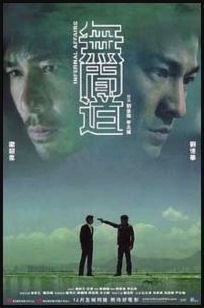
“Infernal Affairs” (2002), directed Andrew Lau with Cannes Film Festival winner Tony Leung and Andy Lau, is about police officer is about an undercover cop who infiltrates a Triad and Triad member who infiltrates the police. After a drug bust goes wrong both the police and the gangsters realize that they each have a mole in their midst and the race begins among the miles to discover each other’s undercover counterpart before his own identity is exposed.
“Infernal Affairs II” is a presequal with a complicated plot involving police and gangsters. It takes place on three time segments, 1991, 1995 and ending in 1997, the year Hong Kong was turned over to China. Lau also made “The Storm Riders”, and “Confession of Pain”, a $10.3 million police thriller coproduced by Japan and Hong Kong with Leung and Taiwanese sex symbol She-Qi and Taiwanese-Japanese heartthrob Takeshi Kaneshiro. Lau’s Hollywood debut “The Flock” stared Richard Gere and Claire Daines.
“The Departed” is an English-language version of Infernal Affairs, directed by Martin Scorcese and featuring Matt Damon, Leonardo DiCaprio, Jack Nicholson, Mark Wahlberg, Martin Sheen and Alec Baldwin. DiCaprio plays the Tony Leung part---a cop infiltrating the mob and Damon plays the Andy Leu part---a gangster infiltrating the police. . Nicholson told a Hong Kong newspaper that he purposely avoided watching “Infernal Affairs” when he was filming “The Departed” so as not be distracted from what Scorcese wanted. “The Departed” won the Academy Award in 2007 for Best Picture. Martin Scorsese won the Oscar for best director. The film was banned in China reportedly because it mentions a Chinese plan to buy military equipment. Another Hollywood company bought the rights to Lau’s Confessiosn of Pain.
“The Karma” (2003), directed by Lo Chi Leung and starring Leslie Cheung, is about strange happenings that begin taking place after a psychiatrist falls in love with a patient. “Initial D” was a big hit in Hong Kong in the summer of 2005. Based on a popular Japanese comic book and starring Anthony Wong Cau-Sang, it is about an abusive, alcoholic father. It did better at the box office than the new Star Wars and Batman movies.
Hong Kong has produced more than its share of crap too, especially in the 1980s and early 90s when hundreds of films were coming out of Hong Kong each year. Among these were “Raped by an Angel 4, The Raper’s Union, Teaching Sucks” and “The Jail in Burning Island”.
John Woo

John Woo is perhaps Hong Kong's most famous action film maker, Described as the "Mozart of Mayhem" and "George Balanchine of ballistic ballet," he is known for popular "heartfelt and hilarious," action-packed Hong Kong gangster movies such as “A Better Tomorrow, Killer, Bullet in the Head” and “Hard Boiled”. His biggest Hollywood success was “Face Off”. In September 2010, Woo will receive a lifetime achievement award at the Venice Film Festival.
Woo artistic violence has been praised by American film directors Martin Scorsese and Quentin Taratino. Woo in turn has said that his major influences for John Woo is known for his slow-motion action, dual pistol diving and motorcycle stunts.his "passionately nutty operatic style" were Scorsese and Sam Peckinpah.
Woo is a short, shy man who greets journalists with a bow. He is in his 50s, and lives in Los Angeles with his wife three children, who are in their late teens and early twenties. He once said, "Actually, I hate violence... I'm not a violent guy. I'm pretty quiet and normal. I love peace." Woo has never fired a real gun or been in a fight as an adult.
In 2010, the Venice Film Festival honored Woo at a star-filled celebration in addition to the Golden Lion for Lifetime Achievement. Woo accepted the award from American director Quentin Tarantino, president of the jury for the main competition at this year’s festival, and Hong Kong director Tsui Hark. He dedicated the award to his mother, wife and family. At a private reception in Venice just before Friday’s award ceremony, a Who’s Who of the Hong Kong film industry gathered to toast Woo, including actresses Michelle Yeoh (Tomorrow Never Dies and Crouching Tiger, Hidden Dragon), Maggie Cheung (In the Mood for Love and Irma Vep); directors Tsui Hark, Andrew Lau and Stanley Kwan; and producers Terence Chang and Nansun Shi. [Source: Dean Napolitano, SpeakEasy blog, Wall Street Journal, September 4, 2010]
John Woo's Life
Woo was born in Guangzhou, China in 1946 and came to Hong Kong at the age of four. His family lived in a squatters camp of several years until they could afford a house in a poor neighborhood, where prostitution, crime and gangsters were a part of everyday life. As a youngster, Woo participated in gang fights, witnessed riots and even saw people killed in front of his house. He told AP, "I always dreamed: One day I really want to fly away from hell. I wished I could go to a better place, [where] there's no crime, no violence, that people only care about each other, love each other and appreciate each other. It was like a dream. And then I could only find my dream in musical films."
Woo once said, "Two things scare me in life: One is having an interview in front of a camera; the other is getting an award...I have a speaking problem---and I don't even speak well in my own language." He said he manages to have success as a director because he only has to say two words. "Action" and "cut."
When Woo gets agitated on the set he likes to stir fry dishes like Cantonese crispy chicken with bean sauce for the crew. "Cooking is the only way I can relax," hew told Newsweek. "You make food beautiful. You watch people eat. It's like making a movie." His favorite food is Chinese steamed fish, Hong Kong-style.
John Woo in Hong Kong

Woo began making films in 1968. After making 26 comedies he scored his first big success with the 1986 film, “A Better Tomorrow”, which also made a big star of the trench-coat-wearing actor, Chow Yun-fat. The film critic John Powers wrote: “It’s all operatic emotions, breakneck pacing. Peckinpah-style, and stylish, movie-star performances...The story itself is a packet of cliches about crime and redemption...it never stops being deliriously entertaining” and “is popular film making with a vengeance. Altogether Chow and Woo made five films together. Three of them were produced by Tsui Hark.
Many regard “The Killer” (1989) as Woo’s best film. It brought both Woo and Chow to an international audience. Chow again plays a trench-coated gangster. This time becomes the protector of a woman he accidently blinded.
Other Woo Hong Kong films include “Hard Boiled” and “Bullet in the Head” (old or new movie). Many of his films have tragic heros who die in the end. “Hard-Boiled” featured Chow Yun-Fat playing Inspector Tequila is a story that revolves around gang warfare in Hong Kong and Chicago, with the kidnaping of Tequila’s ex-girlfriend and daughter as the central plot device, which in the end isn’t that important and serves mainly as a backdrop for the action.
Describing his lifestyle in Hong Kong, he told AP, "I worked crazy. I worked seven days week. I worked 18 hours a day. And I spend more time in office than at home." In his early days of film making Woo described how he and his crew were usually denied permission from shooting on location but they went ahead and did filmed it anyway, shooting quickly and trying to stay one step ahead of the police.
In 2008, John Woo created a video game called “John Woo Presents Stranglehold”, based on his action film “Hard-Boiled”. In the game Chow Yun-Fat plays the central character Inspector Tequila as he does in the movie. Players take Tequila through a series of shooting galleries, in places like a Hong Kong restaurant-casino and a penthouse suite, while chasing and being pursued by gangsters, using furniture and props to block attacks and make escapes.
John Woo in Hollywood
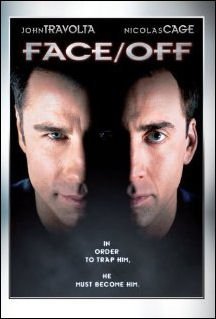
In 1992, Woo signed a contract with the William Morris Agency and moved to Los Angeles from Hong Kong, where he felt overworked. His first Hollywood project, “Hard Target”, was "recut and toned down" by the studios. His second film “Broken Arrow”, a $60 million film with John Travolta and Christian Slater, fared well at the box office but was panned by critics. His third effort, Face/Off, with John Travolta and Nicholas Cage. “Mission Impossible 2" with Tom Cruise was also a huge commercial success.
Accustomed to making films with a small crew in Hong Kong, Woo was a little overwhelmed working with 100 people on “Broken Arrow”. "The shooting take much longer," Woo told Time magazine. "And the catering! In Hong Kong we have only a lunch box for meal breaks. Here we have turkey, seafood, steaks---everything!"
"In Hong Kong, making movies is very simple," hew told Newsweek. "You have a few meetings and then go and make the movie. In Hollywood, it's a complicated and laborious process. Films like Broken Arrow are distributed around the world. It's important to find a balance, for the widest possible audience in the world."
The Hollywood studios reportedly like working with Woo because he delays were minimal and he didn't waste money. That was until he directed the poorly-received “Paycheck” (2003) with Ben Affleck and Uma Thurman
Woo moved from Hong Kong to Hollywood and then returned the Chinese cinema. The John-Woo-produced the gangster thriller “Blood Brothers” was shown at the Venice Film Festival in 2007.
Red Cliff and Reign of the Assassins
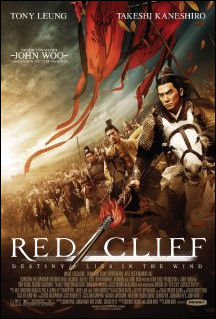
In the mid 2000s Woo began working on a film called “The Battle of Red Cliff”, a Mandarin-language epic about a famous battle by the same name that took place n A.D. 208 that determined the borders of the Three Kingdoms period, when China had three separate rulers. “The Battle of Red Cliff” is a coproduction between the state-owned China Film Group and Woo’s Los Angeles-based Lion Rock Productions. Woo had hopped to film scenes from the movie along the Yangtze River, but was denied permission for the Chinese government.
“Red Cliff” is the most expensive movie ever made in China. It cost $80 million to make and stars Tony Leung and Takeshi Kaneshiro. Woo reportedly spent $10 million of his own money in the film, and spent two years writing and researching the script.
“Red Cliff” set the box office record for a domestic movie in China. It earned $44 million in its first week. At that time only “Titanic” had earned more, taking in $53 million. The film took in $250m worldwide and was crowned Asia's box office champion at the Asian Film Awards.
In some places the film was released in two parts with the first part covering an epic ground battle and the second part focuses on a naval battle. Woo told the Daily Yomiuri, “I loved the story since I was about 10 or 12, I started with comic book...I so admired the heros like Liu Bei, Zhao Yun, Guan Yu, Zhuge Liang.”
“Red Cliff” is the first feature film by John Woo filmed in Asia since he moved his filmmaking operation to Hollywood. Woo told the Daily Yomiuri, “When I go back to Asia, I have to relinquish what I’ve done in the United States. So I have to start over again and I have to go back and learn the language, the thoughts, culture and everything,
“Reign of Assassins” (2010), a Chinese-language film co-directed by Woo with Su Chao-pin, is a martial-arts mystery (with shades of Face/Off) starring Yeoh as a Ming Dynasty assassin. Shelly Kraicer wrote in the Chinese Cinema Digest: ‘su Chao-pin and John Woo’s “Reign of Assassins” (Jian yu jianghu) is a Hong Kong-mainland period action blockbusters that attracted crowds the fall of 2010 to Chinese theaters. The film, starring Michelle Yeoh and Jung Woo-sung, is martial arts action film set in the imperial Chinese past. It is character-based, and anchors its flashy action scenes with the fascinating personalities and mysterious histories of the two fighters it portrays. Shaped with a careful narrative flow and with well-modulated genre shifts, it’s a real accomplishment. I’ll have more to say about it elsewhere.” [Source: Shelly Kraicer, Chinese Cinema Digest]
Fruit Chan
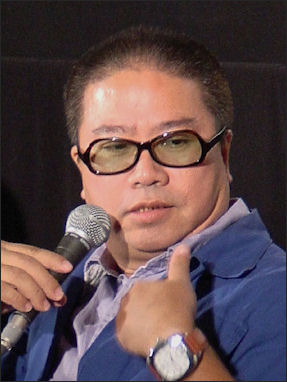
Fruit Chan is a Chinese director who works in Hong Kong. He won the 1998 Hong Kong Film Critics Award for his debut “Made in Hong Kong”. Shot with a five member crew and amateur actors on a shoestring budget of $80,000, it is about the “grim lives of displaced triad youth.”
“Made in Hong Kong” was the first of a trilogy---also including “The Longest Summer” (1998) and “Little Cheung”’set during the handover of Hong Kong to China. “The Longest Summer” was about young triad members. Made with a $1 million budget, it used both professional and amateur actors but had a polished look to it. “Little Cheung” is set in Hong Kong’s noisy, dirty, gangster- and prostitute-filled Mongkok district and features several different stories.
Chan’s forth film “Durian Durian” is a charming film about a young women who spends the first half of the film working as a prostitute in the Mongkok district, where she befriends young girl, and the second half living a more ordinary life in here hometown in Heilongjiang Province in China. The film is named after a delicious but stinky Southeast Asian fruit.
Tsui Hark
Tsui Hark (pronounced Choy Hock) is another highly regarded Hong Kong director Sometimes called Hong Kong's Spielberg, he was born in China, raised in Vietnam and Hong Kong and educated in New York City and the University of Texas. Time magazine’s Corliss, praised his "breathlessly virtuistic style,” using "slow motion, rapid cuts and neck-swiveling pans." The New York Times film critic J. Hoberman called him a a “comic Eisenstein.”
Tsui Hark was described by Shelly Kraicer as the “mercurial, ever-surprising, and (most recently) ever-disappointing anarchic genius of Hong Kong cinema” and “a covert avant-garde filmmaker who thrives inside mainstream commercial genres.” He was a technological leader in the 1990s and now no longer is. His last masterpiece was “The Blade” (Dao, 1995). His films are known for their delirious speed and ramshackle energy. In recent years Kraicer wrote “Tsui has in fits and starts been attempting to remake himself as a mainland Chinese director, or something interestingly hybrid, a HK-cum-PRC filmmaker.” [Source: Shelly Kraicer, Chinese Cinema Digest]
Shelly Kraicer wrote in Chinese Cinema Digest: “Tsui’s manic energy makes him irrepressible. New ideas keep bubbling up, and he’s never afraid to experiment with a commercial fiction film by injecting it with a surfeit of technological, narrative, and genre-twisting gambits. Too often recently, the result has been much less than the sum of its parts.” In the 1980s and early 1990s though the “integrative genius that Tsui incarnated...made his films resonate.” [Ibid]
Tsui is not always easy to get along with. He fired the great autuers: King Hu and Yim Ho from his projects. John Woo walked out in him after Tsui produced and re-edited three of his films, including “The Killer”.
Tsui Hark Films
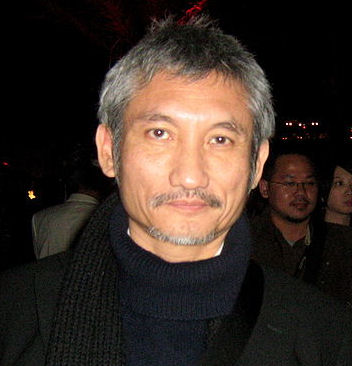
In 1977 Tsui Hark returned to Hong Kong to work in television and make films. Not long afterwards he was producing fast-paced action classics like “Zu: Warriors of the Magic Mountain” and “Once Upon a Time in China”, starring Jet Li. In the mid 1990s he made two Jean-Claude Van Damme films. His masterpieces include “Peking Opera Blues, Once Upon a Time in China I and II, Swordsman, Butterfly Lovers, Chinese Ghost Story trilogy” (with Ching Siu-tung), “Green Snake, The Lovers” and “Time and Tide”.
The all-girl action comedy “Peking Opera Blues” (1986) is set in 1912 in Hong Kong, two years after the fall of the last emperor. Time described as “the most entertaining congestion of politics, stunts and willful women Hong Kong has ever produced.” Hoberman wrote: “”Peking Opera Blues” lures you in with its pounding, crazy beat, The very first image is a close-up of an elaborately made-up Chinese opera performer staring down the camera and howling with laughter...As the title suggest, theater rules: Hark’s cubistic backstage is a cortex of entertainment, greed and intrigue where in three attractive heroines---a comic gold digger, a would-be actress, and a general’s daughter, who for no particular reason (and not every convincingly) disguises herself as a boy---join forces to pursue their separate agendas.”
Tsui’s films in the late 1990s and 2000s vary in quality from flawed but interesting experiments---with the best including the unjustly underrated “Legend of Zu” (Shushan chuan, 2001 and the energetic “Time and Tide” (Shun liu ni liu, 2000) to just plain flawed and puzzling, such as “Missing” (Shenhai shun ren, 2008) and “All About Women” (Nüren bu huai, 2008). “Detective Dee and the Mystery of the Phantom Flame” (2010). “Seven Swords” opened the Venice Film Festival in 2004. [Ibid]
Stephen Chow
Stephen Chow
Stephen Chow is regarded as the King of Comedy in Hong Kong and is praised as both a director and a comic actor. He grew up in a small apartment in Kowloon with his three sisters and began working in films when he was in his 20s. He worshiped Bruce Lee as a youngster. Among the 50 or so films he has been involved in are the classic Hong Kong films “All for the Winner” (1990), “Fight Back to School” (1991), “The Royal Tramp” (1992) and “God of Cookery” (1996).
“Shaolin Soccer” (2001) is a slapstick, martial arts, soccer film with some amusing special effects. Starring and directed by Chow, it is about a band of misfits who use their kung fu skills to take soccer to a new level. It has some entertaining digitally enhanced scenes and was a big hit in Europe and Japan and the rest of Asia but was poorly packaged for American audiences.
“Shaolin Soccer” was banned in the mainland because censored said that combining a temple name and a sport in the title was an insult to Buddhism. Chow refused to change the name of the film to Kung Fu Soccer and was banned from making films on the mainland for one year.
“Kung Fu Hustle” is another slapstick, martial arts comedy with some amusing special effects, starring and directed by Chow. Backed with a $20 million contribution from Columbia pictures, it pays tribute to Bruce Lee and spoofs American films like “The Shining” and “The Matrix”. Set in Canton in the 1930s. it is about a group of glamorous gangsters called the Axe Gang who beat the pulp out of anyone that get in their way and zip around through the air with help of wires and trampolines and digitalized special effects. The most memorable scenes is a dance sequence with axes. As of July 2005, the film had made $54 million overseas.
The Mermaid
The Mermaid (directed by Stephen Chow) was highest-grossing film in China in China in 2016, raking $527 million. The film is about an isolated population of mermaids in a future war with humans, who wish to destroy the mermaids’ habitat as part of a sea reclamation project. Jason Lin wrote: While Stephen Chow films have always been well-received by Chinese audiences, this one turned the trend of Hollywood blockbusters outperforming Chinese films, breaking opening day, opening week [records], and ultimately setting a new high mark for all-time box office. The film’s environmental theme was also notable. [Source: RADII]
In a review of the film, Elizabeth Kerr wrote in the Hollywood Reporter: “Environmental irresponsibility and corporate greed are at the heart of the latest tirade, however delicate, by Hong Kong comedy legend Stephen Chow. Returning to the director’s chair three years after the less than pointed Journey to the West: Conquering the Demons, Chow’s latest is more in line with the early work that made him a hit at home (King of Comedy) and earned him a cult following overseas (Kung Fu Hustle). With no time for allegory or parable, the fantastical Mermaid delivers its message without a shred of subtlety (and is unapologetic about it) but with considerable charm, wit and darkness to make up for it. After a record-breaking debut in China and Hong Kong, overseas markets that embraced Chow at his sweet and snarky best will do so again. [Source: Elizabeth Kerr, Hollywood Reporter, February 14, 2016]
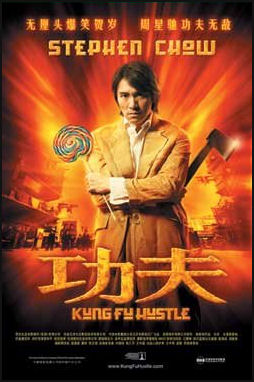 “In a story that could have been ripped from many a headline — mythic fish-people excluded — a ruthless, profit-focused developer Liu (Deng Chao) becomes the target of a group of peaceful but angry mermaids living in the wreck of an oil tanker off the coast of Green Gulf when he buys the land nearby. Liu, of course, has big plans to reclaim the area and make billions of dollars on property but he has to clear the water of its marine life. For this he gets help from a business partner, Ruolan (Kitty Zhang), whose new, agonizing sonar technology was designed to drive away Green Gulf’s dolphin population. The mermaid community, led by Octopus (Taiwanese pop star Show Luo) plots to send Shan (newcomer Jelly Lin, who would have been Shu Qi 20 years ago) to seduce the mogul and then assassinate him. Naturally, the whole plan falls apart in the film’s other major story arc, in which the infiltrator falls in love with the target.
“In a story that could have been ripped from many a headline — mythic fish-people excluded — a ruthless, profit-focused developer Liu (Deng Chao) becomes the target of a group of peaceful but angry mermaids living in the wreck of an oil tanker off the coast of Green Gulf when he buys the land nearby. Liu, of course, has big plans to reclaim the area and make billions of dollars on property but he has to clear the water of its marine life. For this he gets help from a business partner, Ruolan (Kitty Zhang), whose new, agonizing sonar technology was designed to drive away Green Gulf’s dolphin population. The mermaid community, led by Octopus (Taiwanese pop star Show Luo) plots to send Shan (newcomer Jelly Lin, who would have been Shu Qi 20 years ago) to seduce the mogul and then assassinate him. Naturally, the whole plan falls apart in the film’s other major story arc, in which the infiltrator falls in love with the target.
“Fans of Chow’s brand of misanthropic nonsense can also expect more of the same, highlighted by a handful of memorable sequences, both visual and dialogue-based. That said, Chow’s traditional difficulty with female characters also continues: Kitty Zhang’s Ruolan wants to destroy the mermaids because, bottom line, she’s pissed that her boyfriend has dumped her. Women, right? His penchant for torturing them is alive and well, too, and his reliance on tried-and-true storytelling shows no signs of abating. To be fair, Chow still insists on going pitch-black from time to time: Octopus’ self-mutilating sushi-chef gag is as grotesque as it is hilarious; the mermaids are forced to live in grimy, polluted water with festering open sores; and the final open-water pursuit of Shan is like every gruesome Discovery special about whale poaching, or better yet, outtakes from the dolphin slaughter doc The Cove. Much of that darkness mitigates narrative predictability to a degree.
“The opening salvo involves a tour group visiting a kitschy museum of exotic animals, setting the tone for the rest of the film perfectly with its painfully over-the-top faux exhibits, the apex of which is the fake merman who emerges from a greasy bathtub. Nonetheless, Mermaid is generally marked by gleeful irreverence and in-your-face ecological politics with an unchecked development chaser. And while the story is particularly timely in China and Hong Kong, both overwhelmed of late by environmental recklessness and landfill mania, the core ideas and concerns will easily translate for foreign audiences.
“Chow and his army of writers (seriously, it took nine people to write this) get terrific support from a strong cast of regulars and newcomers who really sell the story, cheesy special effects aside. As Liu, Deng has the least to work with as the villain who finds love and redemption, but he runs with the narrative and handles Chow’s signature wordplay well when given the chance. The standouts, however, are Luo and Lin. Luo manages to balance fury with funny, effortlessly leading one of Chow’s requisite Greek chorus of village/restaurant/neighborhood observers. Lin’s is the kind of breakout performance by a young actress Chow is renowned for; he personifies the best supporting actress Oscar of Asia. Though we are often asked to laugh at her instead of with her, Lin’s unforced wholesomeness and innocence combined with her gameness lift the material above its station into something entirely new that Chow himself probably didn’t expect. Visual effects and 3D are suitably cheeseball and pedestrian, respectively — the former doing its part to propel the story and the latter adding, as usual, next to nothing.
Wong Kar-Wai
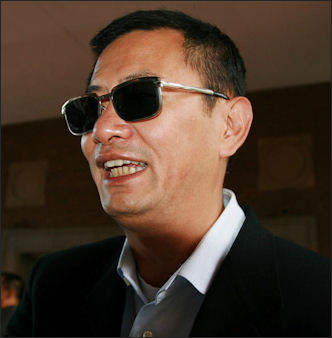
Wong Kar-Wai has been described by Quentin Tarratino as "the most exciting director to come along since I've been a professional filmmaker." Described by people in Hong Kong as being so big there "he doesn't need Hollywood,” he is one director who doesn’t eschew political issues in favor of themes popular with a wide audience.
Wong was born in Shanghai and raised in Hong Kong. He is considered the first “high-style Asian ateur.” He often works with the Australian cinematographer Christopher Doyle and has influenced a number of other Asian film makers. His films have “crazy-paving angles and free structure.” He told the Times of London his style “is not preconceived it is created by instincts.” Wong headed the jury at the 2006 Cannes Film festival.
Wong directed Days of Being Wild (his second film, 1990), regarded by some as one of the best Hong Kong films ever made; the successful “Chungking Express” (1994), and Fallen Angels. He was selected best director at the 1997 Cannes film festival for his “Happy Together”, staring Leslie Cheung and Tony Leung. The film is about a pair of quarrelsome gay lovers who end up on Argentina. “Days of Being Wild” (1990) is about an aging Shanghai socialite who has settled in Hong Kong. It stars singer/actress Pan Dihua, whose real life story mirrors that of the character she plays in the film.
“In the Mood for Love” (2000) is a wonderful film about the passionate but slow-evolving romance between two married neighbors whose spouses they suspect are having an affair with each other. Set in 1960s Hong Kong, it stars Tony Leung and Maggie Cheung. It was Wong’s 7th film and many feel his best.
2046
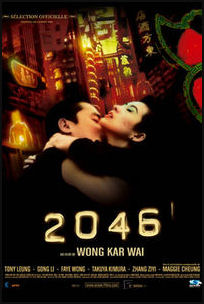
“2046" is drama set in the future and the past and is a lose follow up to In the Mood for Love. One Japanese critic described it as “atmospheric, visually stunning and masterfully explores the human condition.” Tony Leung plays the same role he did in In the Mood for Love---now a womanizing pulp fiction writer becomes involved with a beautiful prostitute (Zhang Ziyi) and is intrigued with the daughter of a hotel owner (Faye Wong) and begins writing a sci fiction novel, “2046", based on his experiences with these women. Episodes from the novel are dramatized in the film. In these parts of the film Faye Wong plays an android.
“2046" received a standing ovation at the Cannes Film Festival in 2004 after the debut was held up because Wong was making last minute changes in Hong Kong while the film festival was going on. Wong himself delivering g the film to the screening after being give a police escort from e airport to make it in time. Tony Leung and Zhang Ziyi won awards for best actor and best actress in 2004 from the Hong Kong Film Critics Society. Faye Wong and Maggie Cheung also put on strong performances. The film took four year to make. At one point production was held up because of the SARS epidemic.
“2046" won best cinematography selected as the best animated film of 2005 by the New York Film Critics Circle.
Wong Kar-wai;s English-language debut, a romance called “My Blueberry Night”, starred Kevin Spacey, Ed Harris Jude Law, Rachel Weisz, Natalie Portman and singer Norah Jones, in her screen debut .
Wong Kar-wai is schedule to shoot “Lady from Shanghai” with Nicole Kidman in 2007.
Danny and Oxide Pang
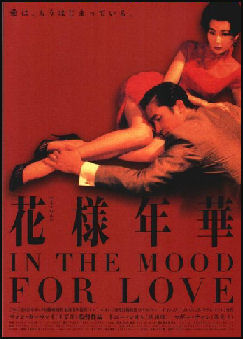
Danny and Oxide Pang are Thai-born, Hong Kong-based identical twins who have directed over a half dozen direct films together and apart. They made “The Eye” (2002) a frightening , well-made, low-tech, ghost story about a blind girl who has her sight restored and starts seeing all sorts of horrible things. Hollywood has bought the rights for the film.
John Hodgeman described their style in the New York Times as “an audacious cascade of varying film stocks, colors and speeds that is equally adept at capturing the agonizing slow motion of a sexual assault as it is the strangely painterly image of a man fighting off a horde of phantoms with his own luminous flatulence.”
Danny and Oxide Pang were born in 1965. They have also made thrillers, crime stories, comedies and psychological dramas, including the retro-Wester-musical “Fa Talai Jone” and the gritty thriller “Bangkok Dangerous”, about a deaf-mute hit man. “The Eye” was the first Hong Kong movie the Pangs made. Before that the worked mostly in Thailand.
The Pangs shot their first English-language film, “The Messengers”, in Saskatchewan. Released in 2007, its about a Chicago family that move to a sunflower farm haunted by a family of ghosts and nasty bunch of crows. “The Eye 10" is a sequel that isn’t really a sequel. It has a completely different story line and is a comedy. It show the desire of the brothers to avoid being pigeonholed.
Even when Danny and Oxide work on the same film they are rarely together. Typically they alternate days on the set with one brother directing while the other works on rough edits of the previous days works. After “The Eye” they worked on separate projects: “Leave Me Alone” by Danny and “Ab-Normal Beauty” by Oxide. Japanese director Hideo Nakata was chosen to direct the Hollywood version of the Hong Kong horror flick “The Eye”.
Ann Hui
Hong Kong’s Ann Hui won best director at Golden Horse Award in 2014 for her historical epic “The Golden Era,” starring actress Tang Wei as the early 20th-century writer Xiao Hong. It was Ms. Hui’s third Golden Horse best-director win, following the 1999 film “Ordinary Heroes” and 2011’s “A Simple Life.” [Source: Real Time China, Wall Street Journal, November 23, 2014]
Shadow Magic (2000) was Hui's directorial debut. It is sort of a Chinese version of Cinema Paradiso, set at the turn of the 20th century, just as film was emerging in China. Her film "The Way We Are" (Tianshuiwei de ri yu ye, 2008) was described as "perfection in its minimalism, its honest adherence to a realist aesthetic, its eschewal of star performance, and its absolute horror of any kind of dramatized, let alone sentimentalized dramaturgy. " “Some people say I was confined to the script, but for me, I would rather follow a well-written script than try to work with a half-decent one,” Ms. Hui said. “Even today, I ask myself what I could have done better and differently to draw out the real strength of the script.”
Kimberley Jones wrote in the Chronicle: "A first-generation New Wave filmmaker, Ann Hui started in television and moved into features in the late 70s. She's tackled just about every genre under the sun, but the autobiographical “Song of the Exile” is a straightforward, quietly affecting family drama. Maggie Cheung stars as Hui's surrogate, Hueyin, a young woman educated in the UK. At the film's beginning, set in the 70s, Hueyin reluctantly returns home to Hong Kong to take care of her widowed mother (played by Tan Lang Jachi Tian), who immigrated after the second Sino-Japanese War. Hueyin then accompanies her mother to her native Japan, and there — unable to speak the language, an odd duck in bell-bottomed jeans — she slowly awakens to the helplessness of cultural alienation that bedeviled her mother, the exile, for so many years."
Ann Hui's A Simple Life
Ann Hui Hui's “A Simple Life” was screened at the Venice and Toronto Film Festivals in 2011. "After an elderly maid for a Hong Kong film producer has a stroke, he finds a nursing home for her to move into," wrote Shelly Kraicer in Cinema Scope. "With that simple premise, based on the real life story of producer Roger Leeand his actual family's amah Chung Chun-tao (aka Ah Tao), Hong Kong director Ann Hui has crafted one of her greatest films. This low-key masterpiece of almost documentary realism features big stars and non-professionals: king of Hong Kong cinema Andy Lau plays Roger and the remarkable actress Deannie Yip plays Ah Tao, while the home's elderly residents play themselves. Ann Hui's brilliant filmography extends back to 1979, and this new work instantly earns pride of place as one of its glories." [Source: Venice Film Festival, September 6, 2011]
Quiet, polite, almost self-effacing Roger (he's at one point mistaken for an air conditioner repairman) negotiates film budgets for a living. At home, he's aided by his family's long time maid, or amah, Ah Tao, who's been with his family for four generations, over 60 years. She's a tough bargainer in her own right, buying just the right ox tongue in the market for Roger's favourite stew. But when she collapses from a stroke, she's the one who needs to be cared for. Following her wishes, Roger finds a nursing home for her to live in. She gradually integrates into this new society of strong-willed seniors, as her physical health continues to decline.
Deannie Yip, winner of two Hong Kong Film Awards over twenty years ago, is remarkable as Ah Tao, embodying a quiet but vibrantly alive woman whose spirit, once sharp, now flickers with age (her performance won Venice's best actress award, where the film premiered). Andy Lau's performance gives her perfect support: reserved, subtle, self-effacingly warm. In one exemplary scene, Lau is standing just behind Yip: the focus is on her, as it should be, but Hui's camera catches, in the slightest change of Lau's facial expression, a flicker of Roger's affectionate nostalgia that revives the whole of his past emotional life with A Tao, shaded with his knowledge that it will soon be lost.
"A Simple Life is loaded with cameos by celebrities from Hong Kong's action-packed cinema including martial-arts legends Tsui Hark and Sammo Hung," notes Neil Young in the Hollywood Reporter. "But, as the title implies, the movie is a world away from its violent extravaganzas. . . Susan Chan and Roger Lee's script is a bittersweet, unmistakably heartfelt look at ties between people who aren't blood relations but who have in effect a mother/son bond. The film is a pretty smooth technical package with crisply high-definition cinematography from Yu Lik Wai — best known for his rather more ambitiously challenging work with Chinese auteur Jia Zhangke — a consistent plus. His clear, direct images suit a movie which thankfully eschews the easy route of heavy-handed tear-jerking: Ah Tao, a sparky, no-nonsense old bird, would surely have approved."
distance from dramatization and sentimentality, but doesn't absolutely abjure them. Traces of dramatized sentiment remain, placing the film inside the wenyi tradition while keeping it largely free from the kind of "melodrama" that has negative connotations in western dramatic aesthetics. Hui does make certain, limited concessions to the kind of dramatization that practical movie-making in Hong Kong now demands , especially movie-making with this level of star power. But her judgement is astute, her compromises are strictly limited. Her film speaks with a liberated assurance, a quiet beauty, in a confidently mature, modestly self-effacing voice that is recognizably a woman's but that speaks directly to our innermost feelings.
Image Sources: Movie posters, Wikipedia, John Woo IMDB
Text Sources: New York Times, Washington Post, Los Angeles Times, Times of London, National Geographic, The New Yorker, Time, Newsweek, Reuters, AP, Lonely Planet Guides, Compton’s Encyclopedia and various books and other publications.
Last updated December 2021

